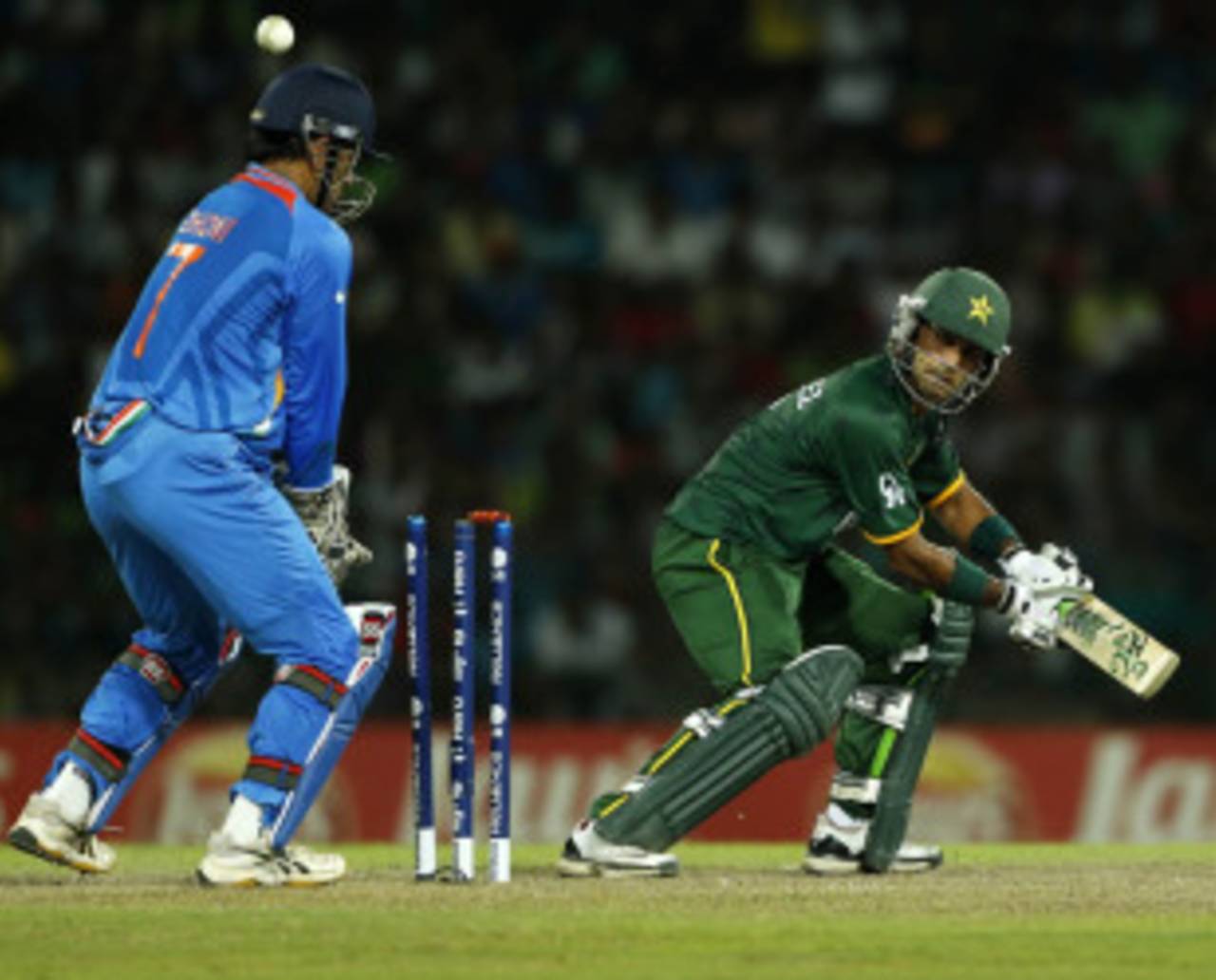Even during the previous act, the stage had been set for the main show. Pakistan and India flags, the former more numerous, had begun to be waved in the Premadasa stands by the innings break of the Australia-South Africa game. The anticipation of the fans rose further with every Shane Watson boundary.
Minutes before the start, Jana gana mana gave way to wild cheering. Pak sarzamin gave way to wilder cheering. It was clear which team had more support at the ground. Yet, somehow, the pulsating, tenacious Pakistan side which had won three successive World Twenty20 games failed to turn up. In its place, the Premadasa witnessed a stop-start, dull group that retreated further after every forward step it took.
Nothing captured Pakistan's state of mind better than Mohammad Hafeez's 28-ball 15, a hesitant, even clueless, stay that sucked all life out of what had been a stirring start. Pakistan were 26 for 1 after two overs. It was nearly impossible to think at that stage that they would add barely a 100 more runs. But Hafeez kept defending and defending without intent for no conceivable reason.
The nature of T20 demands that the scoreboard keeps running, but more than that, and probably more than most other sides, Pakistan are the kind of team who feed off run-making momentum. They also tend to panic that much more when the runs are squeezed out. Even as Hafeez kept blocking, Shahid Afridi, Nasir Jamshed and Kamran Akmal fell in trying to force the innings along.
The move to send Afridi at No. 3 might itself be debated, but it was a gamble the team management took, knowing well that it could have lasted just one ball. His fall might even be attributed to himself, but even during Afridi's short stay, Hafeez played five dots and managed two singles.
Hafeez comes across as a well-meaning man and is probably the best one to lead Pakistan across all formats once Misbah-ul-Haq eventually goes. He has the air of someone who wants to be in control of his team and also wants to give the impression that he is in control. Probably because he never quite got the backing of the selectors and the team management for much of his career, he supports his players, and also wants to give the impression that he is doing so. Throughout the tournament, he has staunchly defended everyone whose place has remotely been questioned, be it Afridi, Umar Gul or Shoaib Malik.
With a Twenty20 international strike-rate of 109.75, though, it is Hafeez's position as opener that should come under question. Pakistan have four openers in their squad for the tournament, and purely on the ability to make an impact, Nasir Jamshed or Kamran Akmal deserves to partner Imran Nazir, with Hafeez dropping down the order.
It is not that Hafeez has not made runs in the tournament. He has a couple of forties against New Zealand and Bangladesh. But those knocks were support acts, while Nazir and Jamshed went berserk at the other end. Today, with Nazir falling early and the experiment with Afridi failing, Hafeez needed to ensure the initial momentum was not wasted. He left that to Jamshed and Kamran, both of whom fell trying to attack the part-timer Yuvraj Singh.
It was now even more crucial that Hafeez carried on, having spent so much time on the wicket, but he fell instead to a nothing shot against another part-timer, Virat Kohli, trying to dab a delivery to off from outside leg stump.
It has been said about Hafeez that when he withdraws into a shell, he remains in it for a while. His diffidence carried itself into the field. He is usually such an active captain, ordering fielders around, snapping instructions, waving his arms, selflessly giving himself the ball in the Powerplay. He was the sixth and final bowler to come on today, as late as the 13th over, by which time Pakistan's chances had almost evaporated.
There was no way you could directly blame Hafeez for Pakistan's below-par fielding and dropped chances, but his diffidence seemed to spread through the team. They hardly looked like a typical Pakistan side, which would have waited like a big cat ready to pounce on the slightest opening. Hafeez, though, did not think there was anything wrong with Pakistan's demeanour on the field.
"Today, India played better cricket than Pakistan, there is no doubt," Hafeez said. "Kohli was excellent tonight, but I don't think there was anything missing as far as our body language was concerned. We really wanted to win the game, but unfortunately we kept losing wickets at regular intervals, so we couldn't come back after the first ten overs. We were looking for a few early strikes when India batted, but once we couldn't get those wickets early on, India got on top of us."
Even towards the end, that man Afridi, demonstrative and energetic as ever, clapped vigorously, trying to drum up passion among his team-mates. But Pakistan simply hadn't turned up at the Premadasa.
Abhishek Purohit is an editorial assistant at ESPNcricinfo
